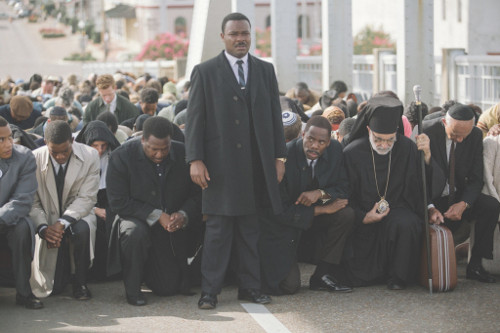British star David Oyelowo gives the performance of his career as Dr Martin Luther King Jr in Selma (pictured below). The film charts King and his supporters as they prepare to march from Selma to Montgomery to highlight the suppression of black voters, and the police and state-sponsored brutality they faced. It feels incredibly timely.
The Oxford-born actor is still best known over here for his long-running television role in Spooks. But since relocating to Los Angeles in 2007 he has appeared in Lincoln, The Butler, Interstellar and A Most Violent Year. Although he is dominant in the film and captures King’s renowned oratory skills and strength, Oyelowo was overlooked for a Best Actor Oscar nomination. There are bigger fights, he insists.
Selma is a film of rare, raw power… We talked about not wanting to make a bog-standard historical drama. We couldn’t have anticipated that [the shooting of unarmed black teen Michael Brown by a police officer in] Ferguson would happen, that Eric Garner [killed by police in New York] would happen and that the racial unrest we are seeing across the world would gain momentum – but we now have a film that not only depicts what happened 50 years ago but is really speaking to the time we are in.
He didn’t walk the planet thinking of himself as a historical figure. He was a man
And it’s saying that we’ve come a long way, and yet we’ve not. Exactly. The Voting Rights Act is being dismantled as we speak. If there is one thing this film shows it is that, yes, things have changed and we have President Barack Obama but we should not take our eye off the ball in terms of making sure minorities are not kept away from the voting booth.
It’s astonishing how young Dr King was, yet he spoke truth to power with such authority. In some screenings people gasp when it says he was assassinated aged 39. He had such a weight to him. People are shocked because we think of things we are doing in our 30s – and we’re certainly not putting our lives on the line for years for people who are disenfranchised. But my job was to find the man behind the iconography, and hopefully that is compelling and revelatory. He didn’t walk the planet thinking of himself as a historical figure. He was a man.
Your Selma co-star Martin Sheen is always asked about politics because he played the president we all wanted in The West Wing. Does this feel like a job that will stay with you for life? It is too early to know but I feel very strongly about the issues in the film. If you are in the public eye you have a platform and I feel I have meaningful things to say about social injustice, human injustice, racial injustice. If my voice is sought, I won’t be shy about saying what I think. It has had a lasting effect on me.










